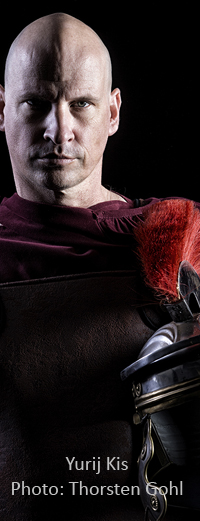
 |
 |
|
Dates and Venue July 15 - August 20, 2016, 8pm and Sun. matinees 2pm (in repertory) | Jericho Arts Centre, 1675 Discovery St., Vancouver Director Richard Wolfe Costume Designer Julie WhiteScenic Designer Heipo Leung Lighting Designer Scott Zechner Sound Designer Patrick Fouchard Stage Manager Maria Zarillo Reviewer Elizabeth Paterson |
||||||||||||||||||||||||||||||||||
|
Howard Brentonís Romans in Britain is as relevant and as unremittingly brutal as the daily news. The play moves through time: Celts are raided by Romans and destroyed by Saxons. Romans, Celts and Saxons together become English and invade Ireland. With each iteration the same brutality appears, and the same suffering. Home and family are swept away as armies plough through and both victims and soldiers become desensitized. Brentonís play is in some ways in-your-face message-based theatre. There are no subtleties of argument or any allowing of the audience to draw its own conclusions. Indeed there are no really likeable characters. Any potentially sympathetic character whether a homesick soldier or a young Druid raped is undercut by a demonstration of, for example, the barbaric cultural practices of the Celts as a slave owning and trading society, or the soldierís utter lack of empathy When this play was first performed in England, the Irish Troubles had been festering for a decade. Gun battles, bomb attacks, incarceration and torture had become commonplace topics. Lord Mountbatten and his family had recently been blown up by Irish terrorists and the Irish citizensí group called the Peace Party had won the Nobel Peace Prize and there was no end in sight. Attacking the position of the British government and the actions of the Army as Brenton did was deliberately provocative. Such warfare is a step removed from our daily lives in Vancouver but it is no bad thing to be reminded so forcibly of what daily life in Syria or Afghanistan or Iraq can be like. Or what happens to soldiers who are required to invade another country. While the original shock value may have worn off, it is still a brave choice to put on such a play. ETC gives the play an energetic assault. Played in the round, with the actors often sitting Brechtian-fashion amongst the audience in the aisles, the performance becomes very immediate. A disturbingly spare set by Heipo Leung depicting barren, rocky ground encircled by powdery dust does duty for heath and shore, England and Ireland without change. Because the scenes set during the Saxon invasions of England alternate with those set in 20th century Ireland, the effect is as destabilizing as the swings between the points of view of the characters. Minimal props (Josina de Bree) and expressive lighting (Scott Zechner) were just enough to identify place and time With sharp, smart army uniforms for Romans and British invaders, plaids in soft, natural dyes, homespun cloaks and shawls for the invaded, Julie White did an admirable job costuming a very large cast through 3 centuries. Some bold contrasts picked out a Roman lady in scarlet silk in the Saxon period and in the 20th century, official uniforms and business-like civilian dress for the IRA perhaps suggested the professionalization of victimness. Themyriad characters come and go, though there are always victims and soldiers. Chad Ellis played the young Druid strongly and sympathetically and was also notable in his other parts. Rebecca Walters, Arianna McGregor, Alexis Kellum-Creer, Yurij Kis, Matthew Bissett and particularly James Gill as O'Rourke, the IRA commander, were consistently able. Ashley OíConnell starred as Caesar, cool, cerebral and authoritative and again as the suicidal British intelligence officer who hallucinates a peace. Quite a bit of Brentonís black humour went unremarked, and the cast seemed more comfortable with the modern scenes than the poetical, historical sections. Nevetheless, Richard Wolfe has presented a thoughtful and energetic view of a challenging drama well worth seeing.
© 2016 Elizabeth Paterson |
||||||||||||||||||||||||||||||||||||
|
|
||||||||||||||||||||||||||||||||||||
|
|
||||||||||||||||||||||||||||||||||||